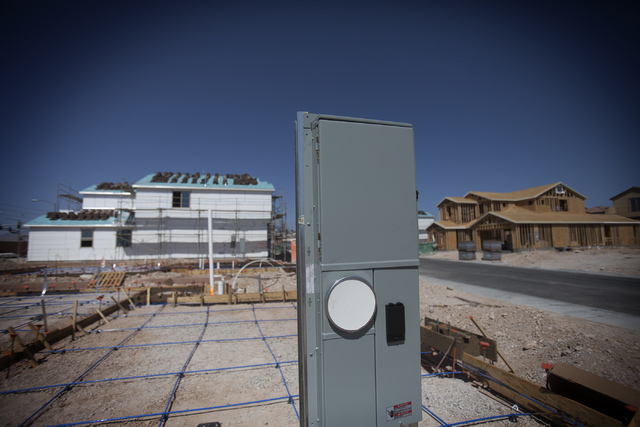Home prices in 20 U.S. cities cool, but Las Vegas leads U.S. in gains
WASHINGTON — Home prices in 20 U.S. cities rose at a slower pace in the year ended February as the residential real-estate market cooled. Still, the biggest gains across the U.S. were in Las Vegas.
The S&P/Case-Shiller index of property values increased 12.9 percent from February 2013, the smallest 12-month gain since August, after rising 13.2 percent in the year ended in January, a report from the group showed Tuesday in New York. The median projection of 33 economists surveyed by Bloomberg called for a 13 percent advance.
All of the 20 cities in the index showed a year-over-year gain, led by a 23.1 percent jump in Las Vegas and a 22.7 percent advance in San Francisco. Cleveland showed the smallest year- over-year increase, with prices rising 3 percent.
Growth in property values eased as rising mortgage rates and severe winter weather restrained demand for dwellings in the first few months of the year. Cooling price appreciation combined with an improving job market will probably help home sales regain momentum later in the year.
“The days of very robust home-price gains are over,” said Thomas Costerg, a New York-based economist at Standard Chartered Plc, who projected the index would rise 12.8 percent. “Elevated price gains are a headwind, especially for first-time buyers. Prices will slow going forward, and the housing market needs that to recalibrate supply and demand.”
The year-over-year gauge, based on records dating back to 2001, provides better indications of trends in prices, the group has said. The panel includes Karl Case and Robert Shiller, the economists who created the index.
“Despite continued price gains, most other housing statistics are weak,” David Blitzer, chairman of the S&P index committee, said in a statement. “Five years into the recovery from the recession, the economy will need to look to gains in consumer spending and business investment more than housing.”
Rising home values, climbing borrowing costs and bad weather took a toll on demand early in the year. The average rate on a 30-year home loan was 4.33 percent in the week ended April 24, up from 3.40 percent a year earlier, according to data from McLean, Virginia-based Freddie Mac.
Sales of previously owned properties fell in March for a third consecutive month, to a 4.59 million annual rate that was the lowest level since July 2012, the National Association of Realtors reported last week. At the current sales pace, it would take 5.2 months to sell houses, a reading that constitutes a tight market favoring sellers over buyers, the group said.
New-home sales in March plunged 14.5 percent to a 384,000 annualized pace, the slowest in eight months, according to Commerce Department figures issued last week. The median price climbed 12.6 percent from March 2013 to a record $290,000.
More recent reports signal residential real estate was starting to stabilize entering the spring selling season. The pending home sales index, which tallies contracts to purchase previously owned houses, climbed in March by the most in almost three years, the Realtors group reported Monday.
Companies benefiting from higher house values and improving demand include D.R. Horton Inc., whose average sales price in the fiscal second quarter ended March 31 was $278,900, up 10 percent from a year earlier. The largest U.S. homebuilder by revenue said orders rose 9 percent in volume and 20 percent in value.
“We are experiencing solid demand and profitability in the heart of our business,” D.R. Horton Chief Executive Officer Donald Tomnitz said on a conference call on April 24.
The same day, PulteGroup Inc., the second-largest U.S. builder by market value, reported an increase in its first-quarter pretax income.
“The industry is still in the early stages of what will be a sustained, multiyear recovery, but one that will develop at a more measured pace than past housing recoveries,” PulteGroup CEO Richard Dugas said on an April 24 conference call.






















